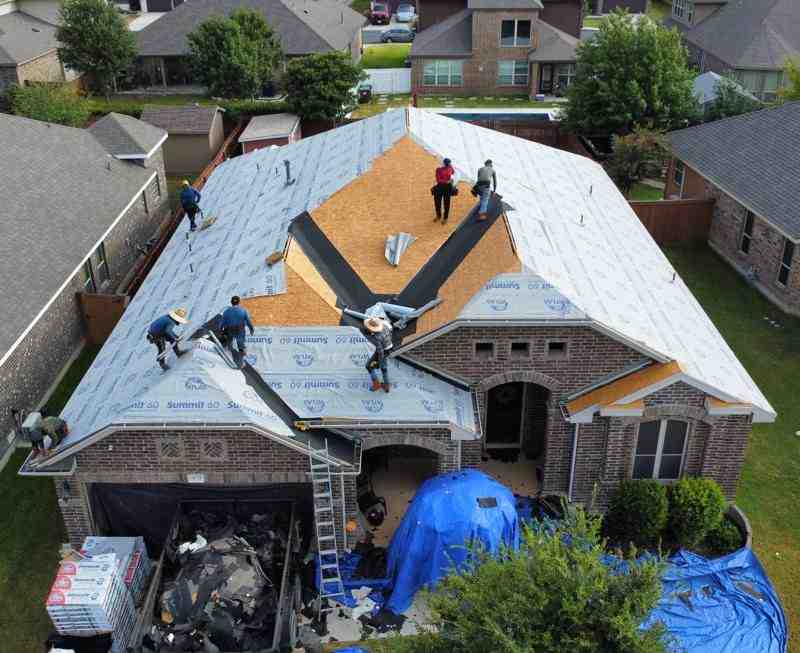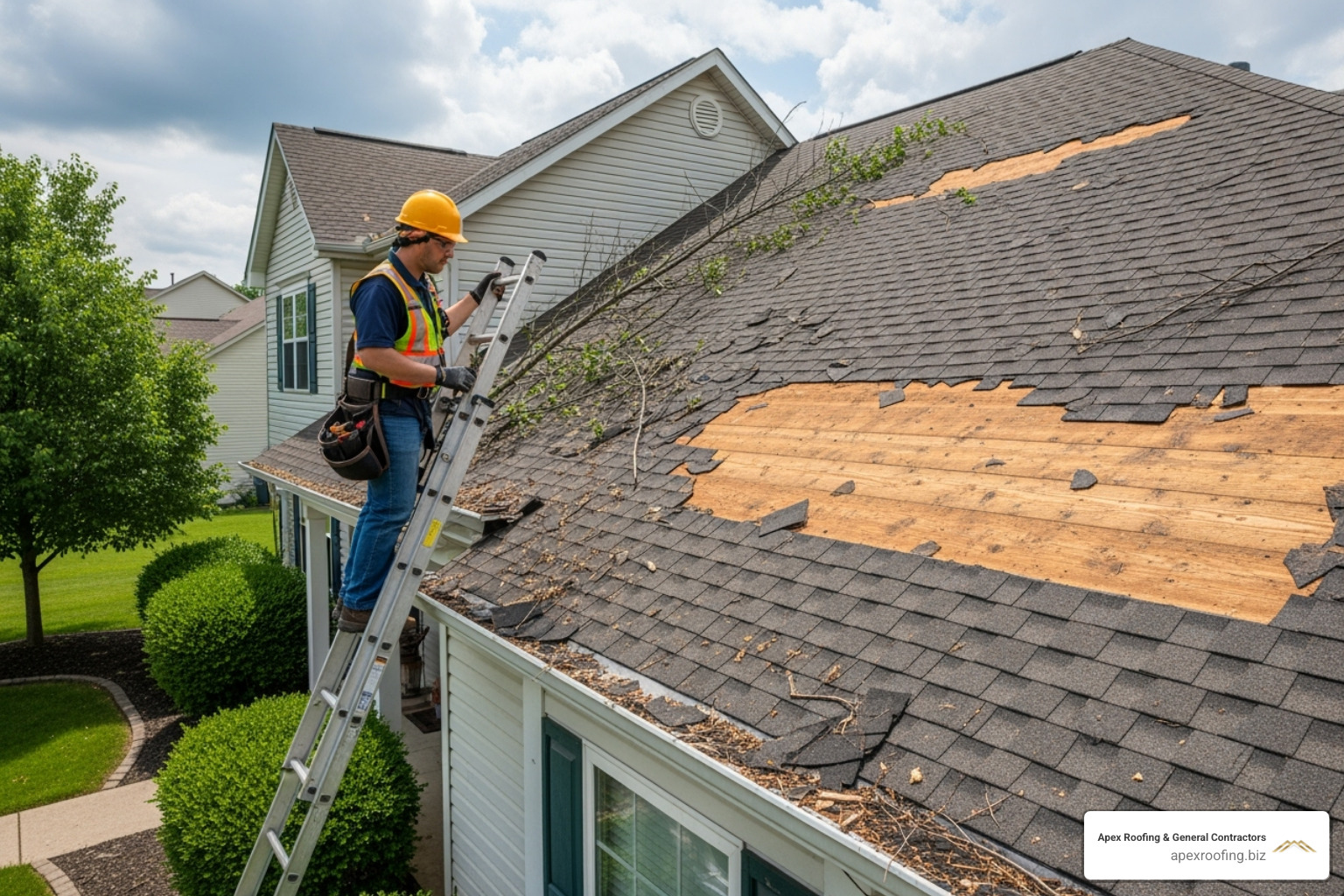Why Choosing the Right Industrial Roofing and Cladding Contractor Matters
Finding qualified industrial roofing and cladding contractors near me is a critical decision for any facility manager or property owner. Your choice directly impacts your building’s structural integrity, operational efficiency, and long-term value. The right partner provides comprehensive roofing and general contracting services that protect your investment and minimize downtime, especially for businesses in San Antonio facing Texas climate challenges like intense heat and sudden storms.
Quick Guide: Top 5 Factors to Evaluate Contractors
- Verify Credentials – Confirm licensing, liability insurance, and manufacturer certifications.
- Check Experience – Review portfolios of similar industrial projects and local references.
- Assess Communication – Ensure transparent estimates, clear timelines, and detailed warranties.
- Evaluate Safety Standards – Confirm OSHA compliance and worker’s compensation coverage.
- Compare Value – Consider long-term ROI, not just the lowest bid.
The growing demand for durable, energy-efficient building envelope solutions means more contractors are competing for your business, but not all deliver the same quality. The difference between a reliable partner and a problematic hire can lead to unexpected costs, project delays, or premature system failure. Industrial facilities have unique challenges, including large roof spans and specialized waterproofing needs, that require an experienced contractor.
This guide walks you through the complete evaluation process, from verifying credentials and assessing experience to understanding material options and asking the right questions. If you need immediate assistance with commercial roofing services, our team is available 24/7. Call (833) 523-5366 for emergency support or project consultations.
I’m Carlos Yzaguirre, President of Apex Roofing & General Contractors. Since 2022, our San Antonio-based team has helped facility managers across Texas select the right contractors for their projects by delivering certified, reliable service with transparent communication and full compliance with local building codes—the exact qualities you should demand from any partner.
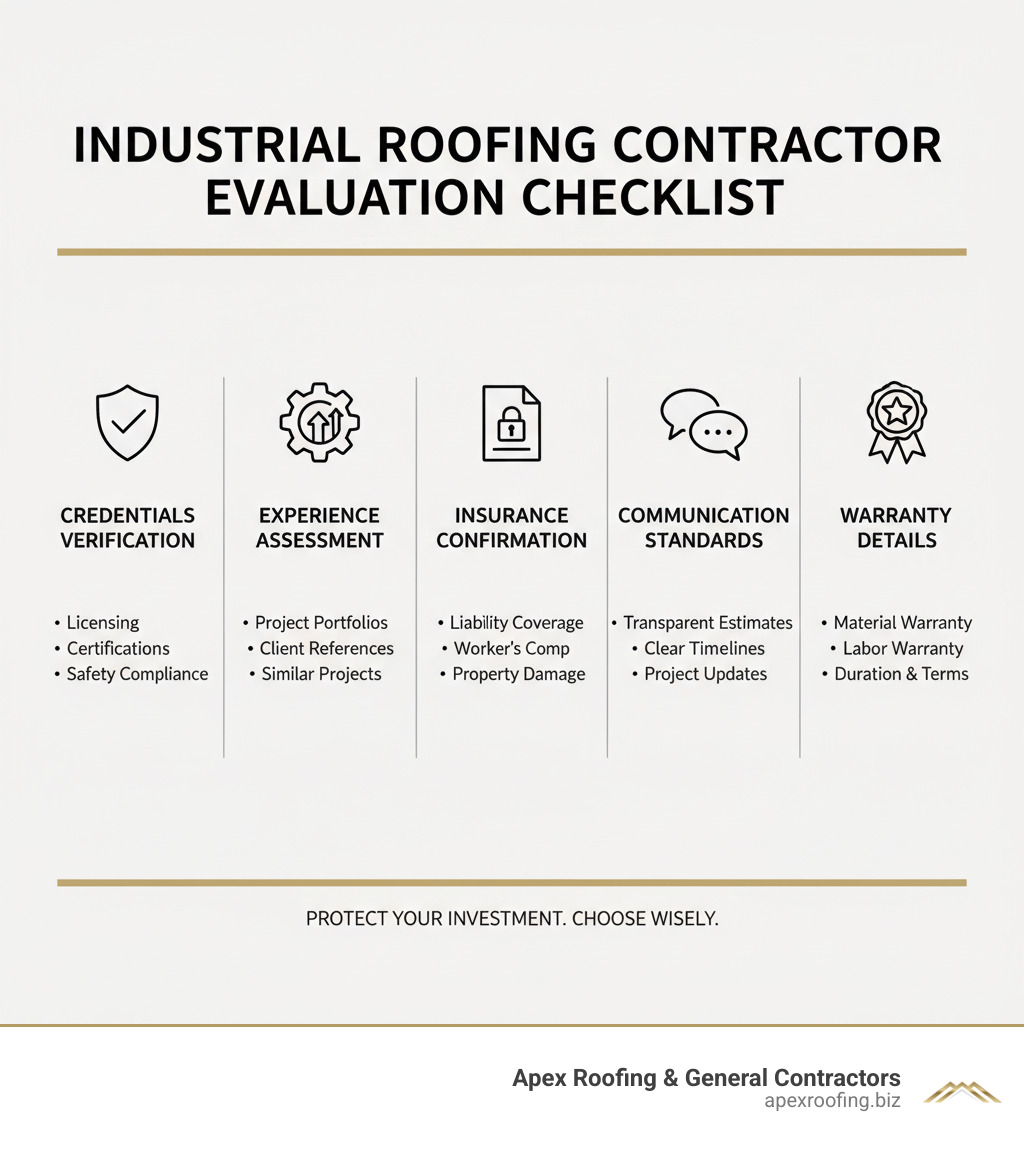
Understanding Core Industrial Roofing and Cladding Services
When searching for industrial roofing and cladding contractors near me, know what these professionals do. They install and maintain the protective envelope of large-scale facilities like warehouses and manufacturing plants. These systems are engineered to withstand extreme weather, protect assets, and ensure smooth operations. Finding the right commercial roofing solutions starts with understanding the specific services you might need.
Core Services Offered:
- New Construction and Installation: Contractors work with architects to design and install complete roofing and cladding systems for new buildings, balancing performance, aesthetics, and budget. This also includes full roof replacements on existing structures.
- Repair and Refurbishment: These services address everything from minor leaks to major damage, extending a system’s lifespan. Refurbishment can involve re-coating metal roofs or upgrading insulation at a fraction of the replacement cost.
- Preventive Maintenance: Regular inspections, cleaning, and minor repairs prevent small issues from becoming costly emergencies. A proactive maintenance plan is the most cost-effective way to protect your investment.
- Emergency Repairs: Reputable contractors offer 24/7 services to address urgent issues like storm damage or severe leaks, minimizing operational downtime.
- Specialized Systems: This includes installing robust industrial gutter systems to manage heavy rainwater runoff and providing comprehensive waterproofing for the entire building envelope.
- Building Envelope Analysis: A holistic assessment of your facility’s roof, walls, windows, and foundation to identify vulnerabilities and improve energy efficiency.
Common Materials for Industrial Projects
Material choice impacts longevity, energy costs, and overall budget. An experienced contractor helps you select the best option for your facility.
- Metal Roofing (Steel/Aluminum): A popular choice offering exceptional longevity (40-70 years), high durability against weather, and fire resistance. It requires minimal maintenance.
- Single-Ply Membranes (TPO/EPDM): Ideal for flat or low-slope roofs. TPO is highly reflective and energy-efficient, while EPDM offers outstanding durability against UV radiation and temperature extremes. Both typically last 20-30 years. You can learn about different flat roof systems to see what fits your needs.
- Built-Up Roofing (BUR): A traditional multi-layer system of asphalt and reinforcing fabrics. It provides excellent waterproofing and durability, lasting 20-30 years, and is great for roofs with foot traffic.
- Modified Bitumen: Similar to BUR but with easier installation. It offers good puncture resistance and weather protection with a lifespan of 20-25 years.
- Composite and Cement Board Cladding: Materials like Nichiha and Hardie board provide superior insulation, durability, fire resistance, and a modern aesthetic for exterior walls.
The industrial cladding market is expected to grow at a CAGR of 7.2% through 2028, highlighting the increasing need for qualified installers who understand these complex systems. Whether you need a complete new installation, targeted repairs, or ongoing maintenance, the right contractor brings both technical expertise and practical problem-solving to protect your facility.
Warning Signs: When to Call an Industrial Roofing Contractor
Your industrial building’s roof and cladding protect your operations 24/7, but they don’t last forever. Recognizing early signs of trouble can mean the difference between a simple repair and a costly shutdown. Proactive assessment is always cheaper than reactive repairs, as waiting until water is pouring through the ceiling often means extensive damage to equipment, inventory, and structural components.
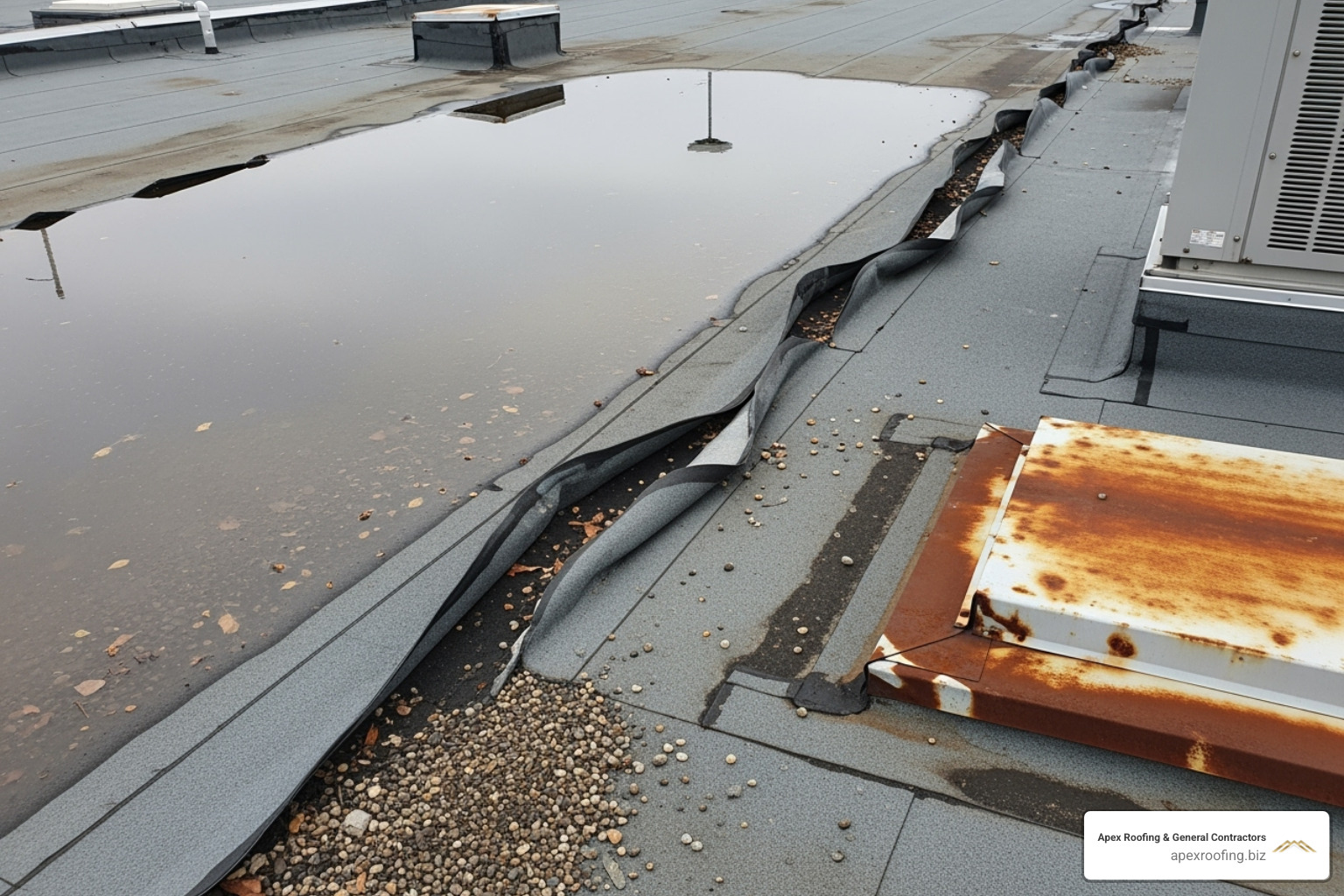
- Water Leaks or Interior Moisture: Dripping water, ceiling stains, or damp spots are urgent signs of a breach. Even small leaks can cause mold growth, corrode steel supports, and damage equipment.
- Visible Cracks or Blisters: On a roof membrane, these signal material failure. UV radiation and temperature swings cause small cracks and bubbles to grow, indicating deeper issues.
- Ponding Water: Water that remains on a flat roof for more than 48 hours after rain indicates a drainage problem. The excess weight stresses the structure and accelerates material deterioration.
- Rust or Corrosion: On metal roofs or cladding, rust means protective coatings have failed. It spreads quickly, leading to holes and structural integrity issues.
- Increased Energy Bills: A sudden spike in heating or cooling costs can point to failing insulation or air leaks in the building envelope, forcing your HVAC system to work harder.
- Loose Cladding Panels: Rattling panels, visible gaps, or pulled fasteners are safety hazards. Loose panels can detach in high winds and allow water intrusion.
- Damaged Gutters or Downspouts: Clogged or broken gutters cause water to overflow, leading to foundation erosion and moisture damage. Your gutter system must handle the large volume of runoff from an industrial roof.
Don’t wait for minor issues to become major problems. If you notice any of these warning signs, contact qualified industrial roofing and cladding contractors near me for a professional assessment. For urgent situations, consult our guide on what to do in a roof crisis. Our team responds 24/7 to emergency calls at (833) 523-5366.
How to Find the Best Industrial Roofing and Cladding Contractors Near Me
The search for qualified industrial roofing and cladding contractors near me requires a thorough vetting process. You are choosing a partner to protect your facility for decades, so it’s not a decision to be rushed. The right contractor brings technical skill, local expertise, clear communication, and a commitment to your project’s success.
Local knowledge is crucial. Contractors familiar with San Antonio’s climate—intense heat, sudden storms, and temperature swings—will install systems designed to perform in this environment. They understand local building codes and have established relationships with inspectors, ensuring a smoother process.
Verify Credentials and Insurance
Before discussing project details, verify the contractor’s professional standing. This is a fundamental step in protecting your investment.
- Licensing and Insurance: Confirm the contractor holds all necessary state and local licenses. Request a certificate of general liability insurance directly from their provider to ensure it’s current. Also, verify they have workers’ compensation insurance to protect you from liability in case of on-site injuries.
- Manufacturer Certifications: Top manufacturers like GAF and Johns Manville offer certification programs. Certified contractors have specialized training to install specific products correctly, which often improves performance and extends warranties. Our credentials as an American Hydrotech Approved Applicator and Berridge Approved Installer reflect our commitment to quality standards. The importance of hiring certified professionals is paramount for protecting your facility.
- Professional Indemnity Insurance: For complex projects involving design work, this insurance protects against errors or omissions in the planning phase.
Evaluate Experience and Local Reputation
A contractor’s track record is a strong indicator of their reliability and expertise.
- Proven History: A long-standing local presence suggests stability and a deep understanding of the industry. Look for a contractor with years in business and a reputation to protect.
- Relevant Portfolio: Ask to see a portfolio of industrial projects similar to yours in scale and complexity. This provides tangible proof of their capabilities.
- Reviews and References: Check independent platforms like Google and the Better Business Bureau for customer testimonials. More importantly, ask for local references from past industrial clients. Ask them about budget adherence, problem-solving, and overall satisfaction.
A contractor who is truly local understands regional challenges. When you need a reputable commercial roofing contractor in San Antonio, that local presence is an invaluable asset.
Assess Their Process and Communication
Technical skill is only part of the equation. A contractor’s business practices and communication style are equally important.
- Clear Communication: From the first call, a professional contractor should listen to your concerns and explain technical concepts clearly. Responsiveness is a key indicator of how the project will be managed.
- Detailed Estimates: Never accept a verbal quote. Demand a comprehensive written estimate that itemizes all costs, including materials, labor, permits, and debris disposal. This transparency prevents surprise charges.
- Project Management: Ask about their project management approach. A dedicated project manager who provides regular updates and coordinates all aspects of the job is essential for minimizing disruptions to your operations.
- Safety Protocols: Inquire about their safety record, training programs, and compliance with OSHA regulations. A strong safety culture protects everyone involved.
- Warranties: Review both material and workmanship warranties carefully. A reputable contractor stands behind their work with clear, comprehensive coverage.
Key Project Considerations: Budget, Lifespan, and Maintenance
Planning an industrial roofing or cladding project involves understanding the full financial picture, setting realistic performance expectations, and committing to ongoing care. These factors determine whether your project delivers decades of reliable service or becomes a recurring expense.
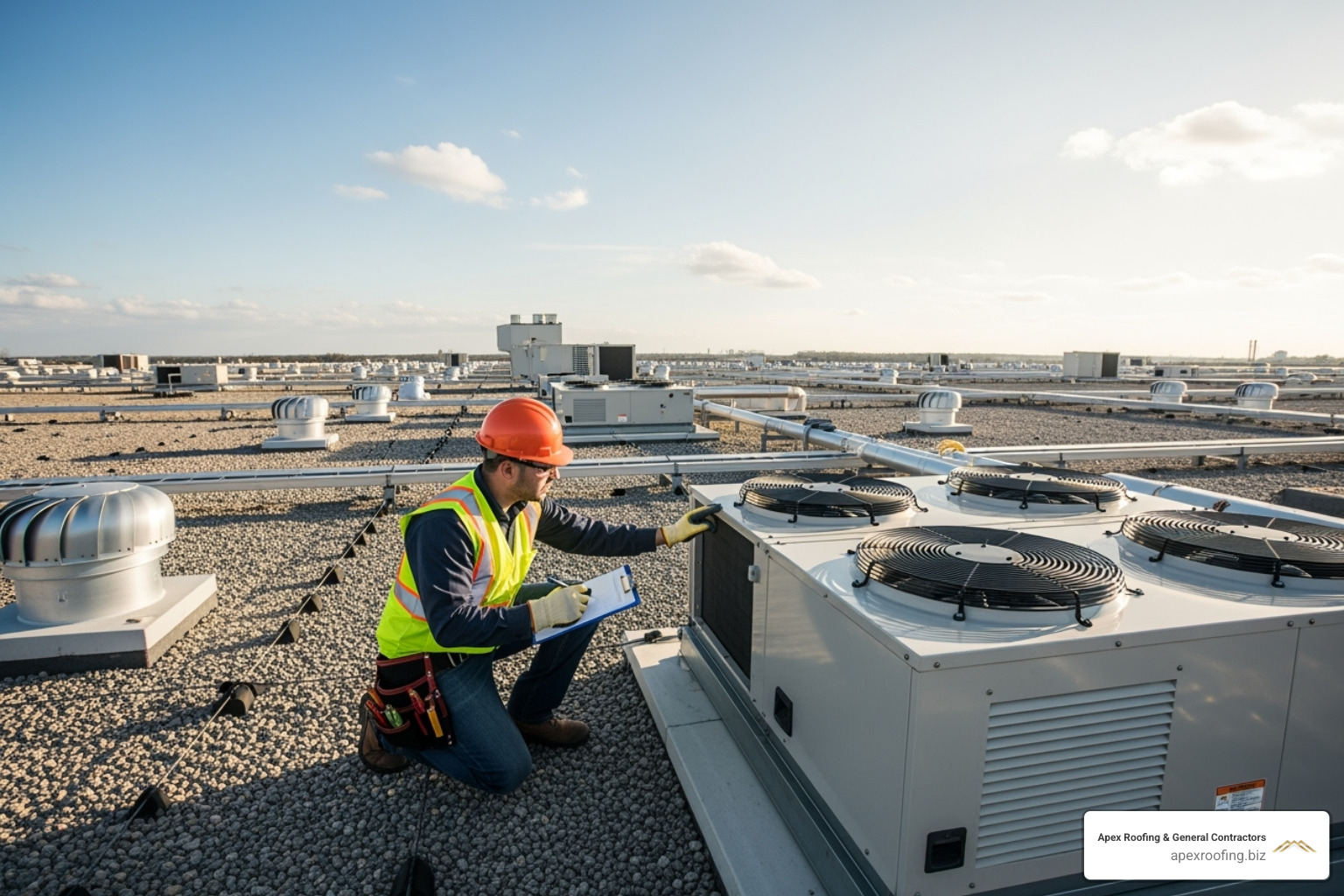
Budgeting for Your Industrial Roofing Project
Smart budgeting requires accounting for all potential costs. Your total project cost will include materials, labor (typically 40-60% of the total), permit fees, and debris disposal. It’s also wise to set aside a contingency fund of 10-15% for unforeseen issues like hidden structural damage that may be finded during tear-off.
The biggest budgeting mistake is choosing the lowest bid without considering long-term value. A roof that costs 20% less but fails in 15 years instead of 30 is not a saving. Focus on long-term ROI by selecting durable, energy-efficient materials that require less maintenance and come with strong warranties. For detailed guidance, we’ve compiled information on commercial roof replacement costs based on real project data.
Typical Lifespan and Required Maintenance
Different roofing systems have different service lives, which is a key factor in long-term asset management.
- Metal Roofing: 40-70 years
- TPO and EPDM Membranes: 20-30 years
- Built-Up Roofing (BUR): 20-30 years
- Modified Bitumen: 20-25 years
A proactive maintenance plan can significantly extend a roof’s design life. Neglected roofs fail early, while maintained roofs often exceed expectations. Key maintenance tasks include:
- Regular Inspections: Schedule professional inspections twice a year (spring and fall) to catch small problems early.
- Gutter Cleaning: Keep gutters and downspouts clear to ensure proper drainage and prevent water backup, especially during San Antonio’s intense storms.
- Seam and Flashing Checks: Most leaks originate at transition points. Regularly check seams, flashings around HVAC units, and parapet walls.
- Prompt Small Repairs: Sealing a minor puncture or tightening a loose fastener costs little but prevents major water damage.
Preventive care is not an expense; it’s an investment in uninterrupted operations and long-term cost stability.
Innovations in Energy Efficiency and Sustainability
The industrial sector is increasingly focused on sustainability and energy efficiency to reduce environmental impact and lower operational costs. Modern industrial roofing and cladding solutions are at the forefront of this movement, offering advanced technologies that deliver significant savings.
How Your Roof Impacts Energy Consumption
Your industrial roof is a critical component of your building’s energy performance. Optimizing it can lead to substantial savings.
- Cool Roofing Technology: These roofs reflect more sunlight and absorb less heat, keeping the building cooler and reducing air conditioning costs. This is especially effective in hot climates like San Antonio. The U.S. Department of Energy provides authoritative information on cool roofs.
- Reflectivity and Emissivity: An energy-efficient roof has high reflectivity (reflects solar radiation) and high emissivity (radiates absorbed heat away).
- Insulation (R-value): A high R-value indicates better thermal resistance, which is crucial for preventing heat transfer in both summer and winter.
The Latest Trends for Industrial Buildings
The industry is constantly evolving with new technologies for higher performance and efficiency.
- Solar-Ready Roofing: Systems designed to easily integrate solar panels, with reinforced structures and compatible membranes.
- Liquid-Applied Roofing: Seamless, flexible coatings that conform to complex roof shapes, providing excellent waterproofing and extending the life of existing roofs.
- Advanced Composite Cladding: New materials that are more durable, lighter, and offer better thermal performance than traditional options.
- Prefabricated Panel Systems: Factory-made roofing and cladding panels that reduce installation time and ensure consistent quality.
- Smart Roofing Sensors: Embedded sensors that monitor for moisture, providing early leak detection for proactive repairs.
Staying current with these trends ensures your facility benefits from the most advanced and sustainable solutions available. For more tips, see our blog on how to prepare your commercial roof for seasonal changes.
Conclusion
Choosing the right contractor is the most critical step in ensuring a successful industrial roofing and cladding project. By verifying credentials, evaluating local experience, and understanding the full scope of your project’s needs—from materials to maintenance—you can protect your investment for decades. The right industrial roofing and cladding contractors near me will not only deliver a high-quality product but also provide transparent communication and adhere to rigorous safety standards.
For facility managers in the San Antonio area seeking a certified, reliable partner, Apex Roofing & General Contractors offers transparent communication and expert compliance with all local building codes. We pride ourselves on our meticulous planning, professional execution, and unwavering commitment to client satisfaction. Our team is equipped to handle the unique challenges of industrial properties in Helotes, Leon Valley, Alamo Heights, Fair Oaks Ranch, Shavano Park, Terrell Hills, and across Bexar County. Protect your facility with a team you can trust. Explore our comprehensive commercial roofing services and contact us for a free estimate, or call (726) 727-7663 to schedule your free inspection.



